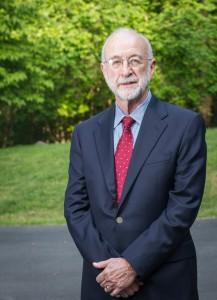
Redford Williams, M.D., a professor of Psychiatry and Behavioral Sciences and of Medicine, and the director of the Behavioral Medicine Research Center at Duke University School of Medicine, received the Lifetime Achievement Award by the International Society of Behavioral Medicine.
The award, the highest honor bestowed by the international society, was presented on Aug. 20, 2014, at the ISBM’s 12th International Congress of Behavioral Medicine in Groningen, Netherlands.
“This award is our most distinguished token of appreciation,” said Joost Dekker, president of the International Society of Behavioral Medicine. “I am extremely pleased that Dr. Redford Williams is the recipient, recognizing his outstanding contributions to the science of behavioral medicine throughout his whole career. Dr. Williams’s research is outstanding, and very well acknowledged in the field of behavioral medicine.”
A former president of the ISBM, Williams has been a member of the Duke faculty since 1972, following a fellowship at NIH. He has been a leader in research aimed at identifying psychosocial factors that increase the risk of medical disorders, the biological and behavioral mechanisms that contribute to disease, and the development of interventions that ease the damaging effects of these risk factors.
The author or coauthor of ten books, including Anger Kills and LifeSkills, and more than 200 articles in peer-reviewed journals, Williams is an international authority on how hostility and anger contribute to coronary heart disease and other life-threatening illnesses.
Most recently, Williams has begun to evaluate the role of genetic factors, particularly polymorphisms of genes involved in regulating functions of the neurotransmitter serotonin, as they affect psychosocial risk factors on health and disease. Williams’s work is funded in part by the National Institutes of Health, which has provided grants to Williams in excess of $50 million since 1974.